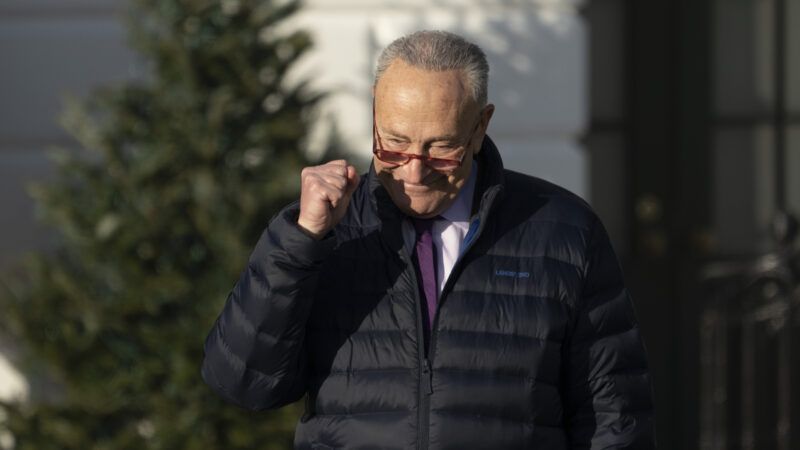Why Take Responsibility When You Can Blame Somebody Else?
The year’s highlights in buck passing feature petulant politicians, brazen bureaucrats, careless cops, loony lawyers, and junky journalists.

Senate Majority Leader Chuck Schumer (D–N.Y.) this month blamed Republicans for preventing Congress from enacting legislation that would make it easier for state-licensed marijuana businesses to access financial services. Yet Schumer himself has played a leading role in blocking the SAFE Banking Act, which passed the House last year with support from 106 Republicans and has bipartisan backing in the Senate.
Schumer, who insisted that his own marijuana bill take priority and warned that approving the SAFE Banking Act would make federal legalization harder, wants reformers to forget that history of obstruction. Schumer's striking attempt to dodge responsibility for his own actions easily qualifies him for my annual review of the year's highlights in blame shifting. Here are the rest.
Omnibus objections. During the December debates over must-pass, end-of-the-year spending bills, Senate Minority Leader Mitch McConnell (R–Ky.) complained that Democrats were "trying to jam in unrelated items," including "liberal nonsense" such as marijuana banking reform. Yet Congress has been engaging in such reckless lawmaking for decades, including the years when McConnell was the Senate majority leader, and the gargantuan spending packages he ultimately supported this year were rife with "unrelated items."
Sore loser. Kari Lake, the former local news anchor who was the Republican nominee for governor of Arizona this year, echoed Donald Trump's false claims about the supposedly stolen 2020 presidential election, promising reforms that would prevent something that never happened from happening again. When she lost to Democratic nominee Katie Hobbs, Lake predictably insisted that voters had not really rejected her, blaming massive fraud instead. A judge found there was no basis for her claims.
Motherless Kraken. Sidney Powell, the lawyer who doggedly pushed a baroque conspiracy theory explaining how Trump had been denied his rightful victory in 2020, suddenly disowned that tall tale when her baseless litigation resulted in legal sanctions. Powell argued that she had only been acting at the behest of her clients, whose wild claims were accepted by "millions of Americans."
Just asking questions. After Smartmatic USA, one of the companies that Powell claimed had participated in the international plot against Trump, sued the Fox Corporation for promoting her wacky allegations, the company argued that it merely reported what the president and his allies were saying. But as New York County Supreme Court Judge David B. Cohen noted in March, Fox News and Fox Business hosts did more than that, lending credence to Powell et al.'s fanciful claims, which they often presented as fact.
The Centers for Pain Relief Prevention. In November, the Centers for Disease Control and Prevention (CDC) published a revised version of its 2016 opioid prescribing guidelines, which had inspired arbitrary restrictions on the medical use of narcotic analgesics, resulting in undertreatment, reckless "tapering" of doses, patient abandonment, and suicides. According to the CDC, which blamed misinterpretation and "misapplication" of its advice, none of that was its fault.
"I'll gladly resign." After a gunman killed 21 students and teachers at an elementary school in Uvalde, Texas, last May, the state's director of public safety, Steven McCraw, blamed the school district's police chief, Pete Arredondo, for the long delay in confronting the attacker. But it later became clear that employees of McCraw's department were complicit in that "abject failure." McCraw reneged on his promise to resign if that turned out to be the case.
Shots in the dark. On the night that Louisville police killed Breonna Taylor in 2020, Detective Brett Hankison blindly fired 10 rounds into the side of her apartment, shooting through a glass patio door and a bedroom window that were both covered by blinds. During his trial for wanton endangerment this year, Hankison said he was trying to "stop the threat" posed by Taylor's boyfriend, who had fired a shot at the cops after mistaking them for invading criminals. A state jury acquitted Hankison in March, although he and three other officers who were involved in the raid still face federal civil rights charges.
© Copyright 2022 by Creators Syndicate Inc.


Show Comments (106)